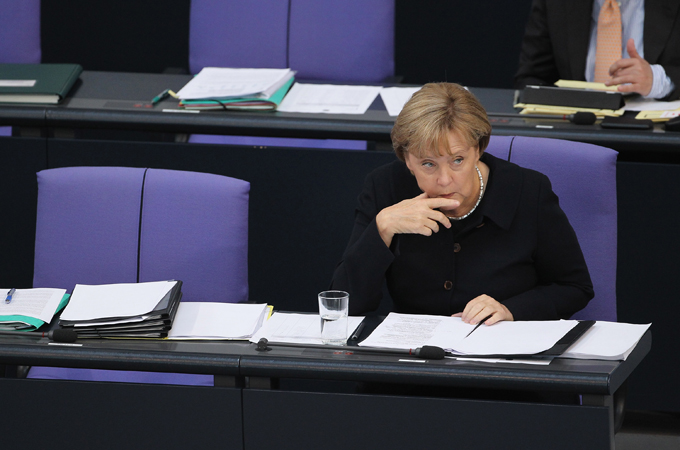Who can we trust to solve the debt crisis?
The world’s public is realising that their leaders have no idea what to do about an increasingly global economic crisis.

 |
| German Chancellor Angela Merkel has been criticised for lacking a good understanding of currency exchange [GALLO/GETTY] |
Airline companies in the US don’t provide newspapers to flyers anymore – except, on occasion, the lowbrow USA Today. You realise what the consequences are when you travel to or through Europe, as I did the other day, to find copies the Wall Street Journal, Financial Times, and other business-oriented publications more readily available for popular consumption.
Even as you are exposed to more news and analysis, filling in gaps in what you know, you begin to ask yourself: What do they know? How wise and informed are the majordomo decision makers who we are counting on to get us out of the deepening economic crisis?
What you find while hop-scotching around the headlines is that no one really agrees on much and even fewer know what they are talking about.
Here’s the Wall Street Journal reporting: “Heavy-hitting euro-zone politicians really don’t understand currencies.”
What? Aren’t these people the ones we are supposed to trust to straighten out the mess?
Global incompetency
The article then dissects and demolishes German Chancellor Angela Merkel’s understanding of the relationship between the euro and the Swiss franc, which she reportedly falsely claimed are pegged to each other.
Writer Katie Martin scolds her: “Mrs Merkel must surely know that if one currency falls, another has to rise. It simply isn’t possible for a currency to rise and fall in isolation. She must, or should, be aware of the hideous mess the euro crisis is spreading around the world.”
Phrases like “she must, or should be aware of” are what’s really frightening here, indicating once again that many in power don’t know what’s happening – or more importantly how to respond.
|
“Mrs Merkel must surely know that if one currency falls, another has to rise … She must, or should, be aware of the hideous mess the euro crisis is spreading around the world.” Katie Martin, Wall Street Journal |
There’s one page in the paper with three stories. “Berlusconi wins austerity bill’s passage.” There is a photo of Silvio-the-skirt-chaser looking glum, resting his head in his hands, a picture of agony because he knows the storm of protest he must now expect.
Below the fold, there’s “UK economy turns darker” as unemployment rises to record levels. Clearly, their austerity program has only helped to make things worse. More major strikes are on the way.
Next to that account of gloom and doom is a cheery forecast from US Treasury Secretary opining in the face of economies on the way down that Europe is in fine hands. The headline: “Europe is able to handle debt crisis, Geithner says.”
Huh?
Jump to the front page of the International Herald Tribune and we read about “Economist does his best to stop push for austerity”.
The lead article is about Adam Posen, a US expert on the Bank of England’s monetary policy committee, who is calling for a “shock and awe display of coordinated central bank attacks aimed at reviving sluggish economies”.
Austerity measures are not the answer
Posen, who studied Japan’s lost decade of no growth, says austerity of the kind in place in Britain, Greece and now Italy is precisely the wrong way to go. The Herald Tribune says he is “tilting at windmills”.
The Financial Times meanwhile is telling us that China’s message to a hands-outstretched Europe is: “Put your own house in order.” Uh, oh – that means China will not be helping any time soon?
There are also stories on downgrades of French banks being “rocked” by decisions of the Moody’s Ratings Agency and Britain who about to sue the European Central Bank – another case of European nations lashing out at each other.
For more accurate and informed assessments, leave the newspapers with their stew of contradictory headlines and visit blogs such as NakedCapitalism.com featuring a study by “Anne Sibert … the wife of former central banker, now Citigroup chief economist, Willem Buiter, who was a very outspoken and vocal critic of the Fed during the crisis, particularly of its “quasi fiscal role”, meaning the way it subsidised banks in ways that involved taking real balance sheet risk outside Congressional budgetary processes. Buiter argued this might well be a violation of the Constitution.”
 |
| The European Central Bank’s legitimacy has been damaged, argues Anne Sibert [GALLO/GETTY] |
Sibert’s explained her latest argument on VoxEU, another very informed site:
“The European Central Bank was once known for its obsessive focus on price stability. Since the global economic crisis, however, its role has extended to preventing the insolvency of banks and sovereign countries. This column argues that such a move has badly harmed the institution’s legitimacy – something that will damage both its policy effectiveness and confidence in the governing bodies of the EU as a whole.”
Without delving into all the details and the ongoing debates, suffice it to say most of the time you can’t believe what you read in the news outlets that are supposed to be the best informed. And you certainly can’t rely on politicians who rely for advice from advisors who rely on these same news accounts for their policy choices and message points.
A closed world of closed minds
Increasingly, these discussions involved a kind of faith-based analysis like the ecclesiastic discourse of the Middle Ages in Europe. Then, the priests followed the bishops, the bishops the cardinals, and the cardinals followed the pope. “Whatever you say, sir” was the mantra of the moment.
How much has it all changed over the decades and millennia? In this world of rigid ideologies, facts were fungible. And they still are.
The new edition of Harvard’s journalism review Nieman Reports carries my latest article on media complicity in the financial crisis. The piece recounts my own experience in trying, but failing, to sound the alarm about the financial meltdown of 2007 and 2008.
This prestigious journal wouldn’t have carried the piece if they thought it lacked all creditability. In it, I recount complaints that only 15 members of the 15,000 members of the American Economic Association predicted the crisis.
I also argue, citing a well-known financial journalist, that many reporters on Wall Street were and still are embedded in a pro-corporate narrative unable and unwilling to report on the conflicts of interest and contradictions. In a play on NBC’s long-running Sunday interview program ‘Meet The Press’, one economist does a weekly column of financial media criticism called “Beat the Press”.
The media, the economists and the politicians seem to be in a symbiotic dance to keep the real issues obscured and incomprehensible to most of the public.
News Dissector Danny Schechter directed the film Plunder: The Crime of Our Time, on the financial crisis as a crime story. He blogs at newsdissector.com. Send comments to dissector@mediachannel.org
Follow Danny Schechter on Twitter: @dissectorevents
The views expressed in this article are the author’s own and do not necessarily reflect Al Jazeera’s editorial policy.
